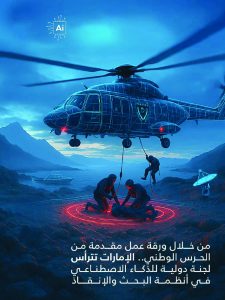ABU DHABI / WAM
In a landmark decision during its virtual session on June 13, 2025, the global COSPAS-SARSAT organisation established a new international working group focused on artificial intelligence applications in satellite-aided search and rescue systems, with the UAE appointed as chair. This development follows the successful series of international meetings hosted by Abu Dhabi from May 27 to June 5, 2025, where key advancements in space-based search and rescue technologies were discussed. The UAE’s National Guard Command, through the National Search and Rescue Centre, presented a comprehensive working paper that laid the foundation for the creation of this specialised committee.
The proposal, widely recognised for its innovation, calls for the integration of AI into Mission Control Centre (MCC) operations to enhance the performance, speed, and accuracy of distress signal processing across satellite networks. By leveraging intelligent data analysis and cross-system integration, the initiative aims to significantly improve global response times and operational efficiency in life-saving missions. The move was praised by representatives from 45 countries and major international organisations, including the International Telecommunication Union (ITU), the International Civil Aviation Organisation (ICAO), and the International Maritime Organisation (IMO), who acknowledged the UAE’s leadership in advancing humanitarian rescue capabilities through cutting-edge technology. Under the newly adopted framework, the UAE-led working group will coordinate technical collaboration among member states, develop AI-driven tools for mission control systems, and foster global readiness and responsiveness in search and rescue operations. The committee also formally commended the UAE for its transformative contributions, underscoring its strategic role in modernising the COSPAS-SARSAT system and reinforcing its position as a key player in international emergency response efforts. Looking ahead, the committee will work to establish global standards for AI integration in space-based search and rescue systems, promote knowledge exchange, and welcome new partners eager to contribute to this forward-looking initiative.
 The Gulf Time Newspaper One of the finest business newspapers in the UAE brought to you by our professional writers and editors.
The Gulf Time Newspaper One of the finest business newspapers in the UAE brought to you by our professional writers and editors.
